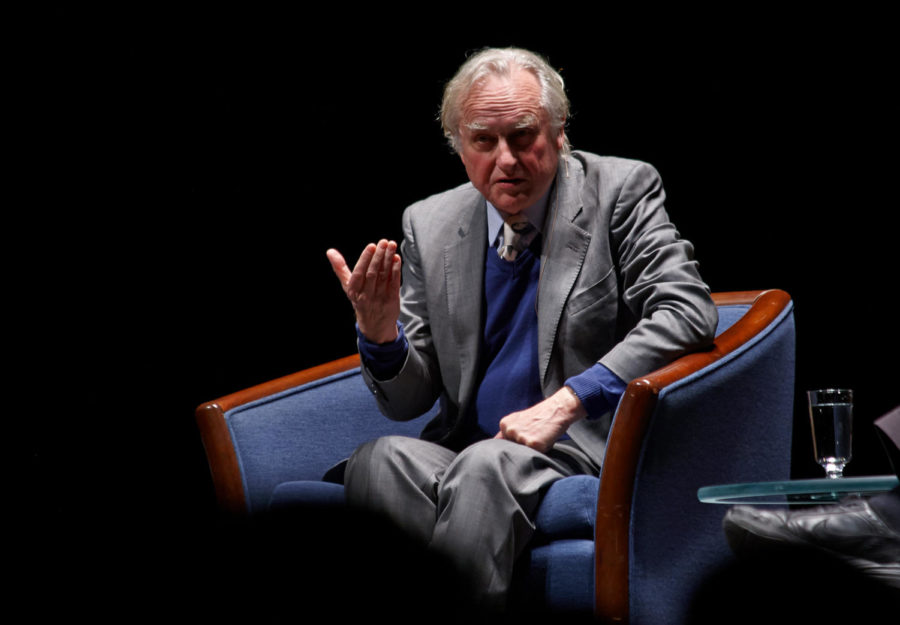Biologist Richard Dawkins combats creationism
Richard Dawkins explains the process of convergent evolution to an audience at Stephens Auditorium on Nov. 17. Though his education is in zoology, he has become an proponent of atheism and founds his world view in what he can observe.
November 18, 2014
For Richard Dawkins, the mystery of science is enjoyable, and the idea of creationism is a staggering illusion.
Dawkins, evolutionary biologist and secularist, shared his views on creationism, evolutionism and moral decisions with a nearly full Stephens Auditorium on Nov. 17.
Almost every seat in the lower level was full of students and community members to hear the internationally-known Dawkins speak about his newest book, “An Appetite for Wonder: The Making of a Scientist,” with Clark Wolf, director of the bioethics program, as moderator.
Wolf asked Dawkins about his thoughts on legislation proposed in 2009 allowing the discussion of creationism in Iowa public schools.
“I am a lover of truth,” Dawkins said. “The fact that we can explain the illusion of design [in] the earlier pseudo non-explanation … offends me as an educator because I feel it gets in the way of young people [learning] the elegant beauty of why they exist.”
Not all religious people are creationists, Dawkins said, but he wants to fight against naive creationism.
Schools cannot allow for equal time for all views on how people were created, Dawkins said, and he gave an example with Christianity.
“It takes you all of about 10 minutes to explain creation theory,” Dawkins said. “Not even. God did it. That’s it. Is that equal time? Why give time to the book of Genesis, just one of hundreds of origin myths of the world. You could just as well study the Nigerian … or the Hindu origin. Do we have equal time for all of them?”
Dawkins also touched on the topic of criticism and religion in general, saying people are accustomed to criticism of politics, restaurants and plays, but a religious critique strikes a soft spot.
“Challenging is a mark of respect,” Dawkins said.
He has had decent conversations with religious leaders, he said, but also said, “I respect you as a person too much to respect your ridiculous beliefs.”
Logan Hemphill, freshman in elementary education, said he came to hear Dawkins speak to learn more about the subject and said he agreed with some of what Dawkins had to say.
“I learned a lot,” Hemphill said. “I don’t consider myself an atheist, but I can see both sides.”
Hemphill said he agreed with Dawkins’ views on moral codes, in that a person’s moral code is not connected to a religion but more connected to which generation that person grows up in the most.
Breanna Kixmiller, freshman in integrated studio arts and performing arts, said she could agree with some of what Dawkins said, including his take on moral code, but didn’t fully agree with his take on religion.
“It was kind of hard for me to listen to some of it just because I am religious,” she said. “It’s not a bad thing. There was a lot of stuff he was talking about that I could completely agree with but also some of it that I just couldn’t take at face value because of some of the things I’ve been learning since I was born.”
Kixmiller also said she didn’t agree with Dawkins saying there wasn’t room for anything that didn’t have research behind it.
“If something doesn’t have facts [that means] there’s no point believing in it? I guess that was hard for me to take,” she said.
Arko Provo Mukherjee, graduate student in electrical and computer engineering, said he enjoyed the lecture and agreed with much of what Dawkins said.
“I think it’s possible to be moral and a nonreligious person,” said Mukherjee, who is also the president of the Graduate and Professional Student Senate. “I think it’s also possible to be an immoral and religious person. I don’t see a correlation between morality and religion. You can be one and not the other.”
Ram Sam, senior in horticulture, said he’s glad the university brings in lecture such as this one.
“It’s great that the university invites people who like science so they can discuss their views in a liberal environment without interruption,” he said. “It’s an essential function to the university.”

















